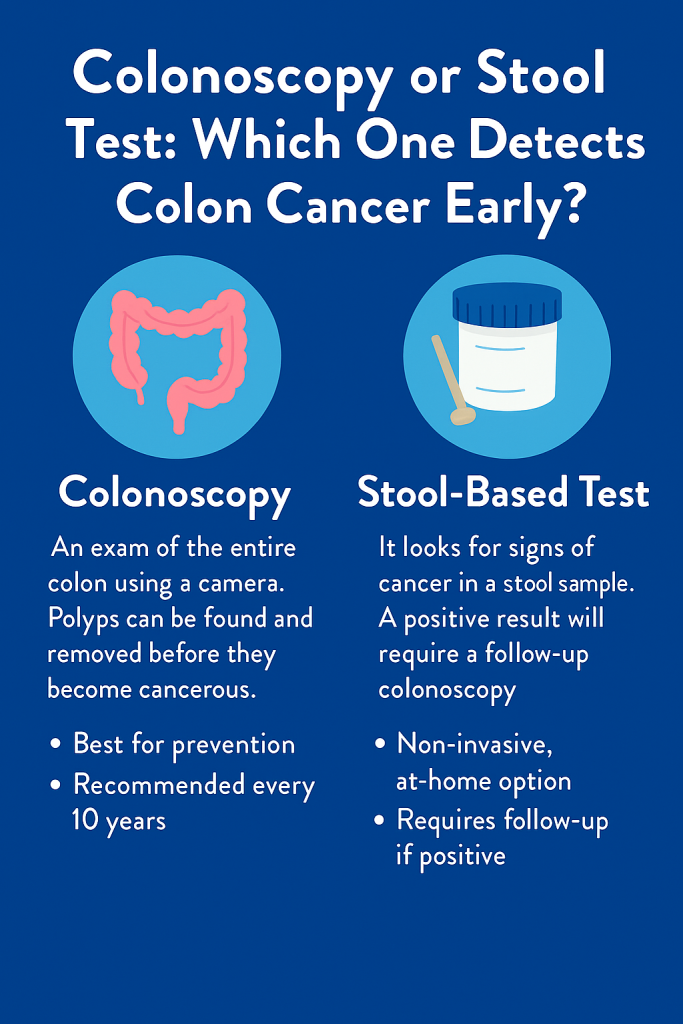Understanding the Need for Colon Cancer Screening
In the US, colon cancer ranks as the second most common cause of cancer-related mortality. The good news? If detected early, it’s also among the most preventable. Timely screening is therefore crucial. But when it comes to screening, a lot of patients ask “Should I get a colonoscopy or is a stool test enough?”
Although they function differently, both tests seek to identify early indicators of colon cancer. Let’s dissect what you actually need to know in order to make the best decision for your health.

The Purpose of Colon Cancer Screening
Finding cancer or abnormal growths (polyps) before symptoms appear is the aim of screening. Doctors can remove polyps before they become cancerous if they are discovered early. Therefore, even if you feel completely healthy, routine screening is essential.
Colonoscopy vs. Stool Test: The Key Differences
Colonoscopy: A Comprehensive Internal View
A colonoscopy allows your gastroenterologist to visually inspect the entire colon and rectum using a flexible camera. During the procedure, they can:
- Detect and remove polyps
- Biopsy suspicious tissue
- Evaluate inflammation or other abnormalities
Pros:
- Gold standard for detecting polyps and cancer
- Can treat issues during the procedure
- Only needed every 10 years for most people
Cons:
- Requires bowel prep and sedation
- Done in a medical facility
- Slight risk of complications
Stool Tests: Convenient but Limited
Stool-based tests (such as FIT or Cologuard) check your stool for hidden blood or abnormal DNA that may indicate colon cancer or polyps.
Pros:
- Non-invasive and done at home
- No prep or sedation needed
- Less expensive
Cons:
- Less accurate, especially for detecting polyps
- Must be done more frequently (every 1–3 years)
- Positive results still require a colonoscopy for confirmation
Which Test Detects Colon Cancer Earlier?
Colonoscopy continues to be the most precise and comprehensive screening technique for early detection. By identifying precancerous polyps and cancer, it enables medical professionals to take action before issues worsen.
For those at average risk who are reluctant to have a colonoscopy, stool tests can be helpful. They might, however, overlook early-stage cancers or smaller polyps that a colonoscopy would detect.
Who Should Get Screened and When?
For people at average risk, colon cancer screening should start at age 45, according to the American Cancer Society. But you might require more frequent or earlier testing if you:
- Have a family history of colon cancer or polyps
- Suffer from inflammatory bowel diseases like Crohn’s or ulcerative colitis
- Have had colon polyps in the past
- Experience symptoms like blood in the stool, unexplained weight loss, or abdominal pain
When to Choose a Colonoscopy
You should strongly consider a colonoscopy if:
- You’ve had abnormal results on a stool test
- You have symptoms like rectal bleeding or chronic abdominal pain
- You have a high risk of colon cancer due to family history
When a Stool Test Might Be Enough
A stool test may be appropriate if:
- You’re at average risk and prefer a non-invasive option
- You’re not ready to undergo a colonoscopy
- You plan to follow up consistently with screening every 1–3 years
What Dr. Karim Shakoor Recommends
As a board-certified gastroenterologist, Dr. Karim Shakoor and the team at Colon & Digestive Health Specialists LLC recommend colonoscopy as the most reliable method for colon cancer screening.
Each patient’s situation is unique, so we offer both testing options and help you make an informed decision based on your risk level and comfort.
Take Charge of Your Colon Health Today
Early detection could save your life. Whether you prefer a colonoscopy or a stool test, the key is to get screened regularly.
👉 Book an appointment with Dr. Karim Shakoor today to discuss your screening options and protect your long-term digestive health.
Colonoscopy is considered the gold standard for accuracy in detecting colon cancer and polyps.
Every 10 years starting at age 45 if you’re at average risk. High-risk individuals may need more frequent testing.
Stool tests can be useful for early screening, but they do not replace colonoscopy in accuracy or scope.
You’ll need a follow-up colonoscopy to determine the cause of the abnormal result
Yes. Early detection and removal of polyps via colonoscopy can prevent colon cancer from developing.
